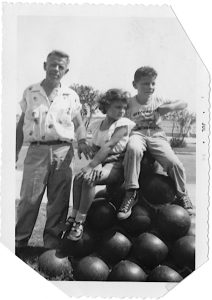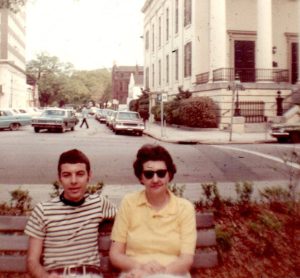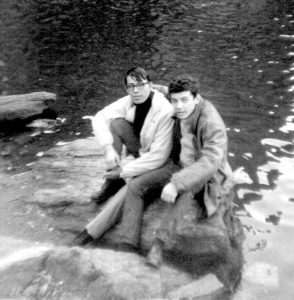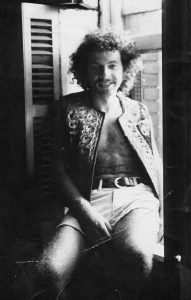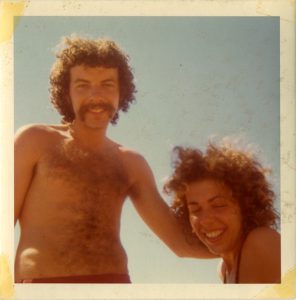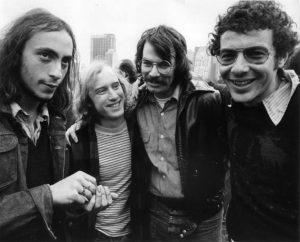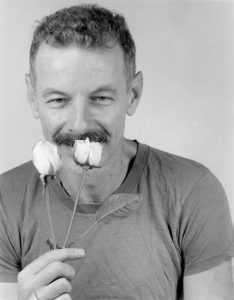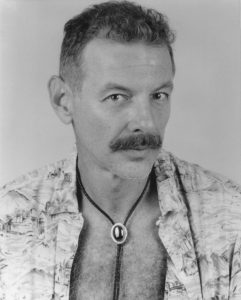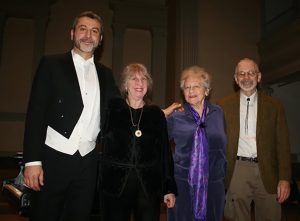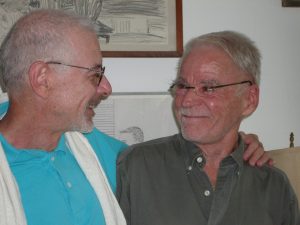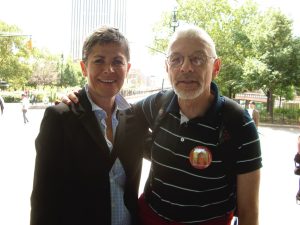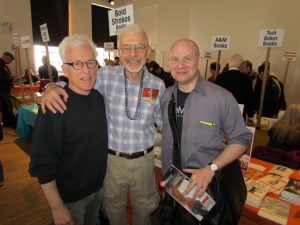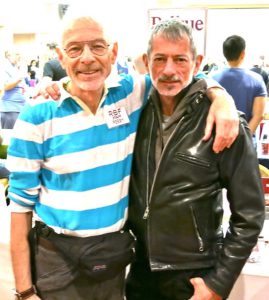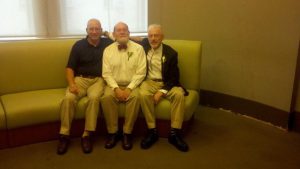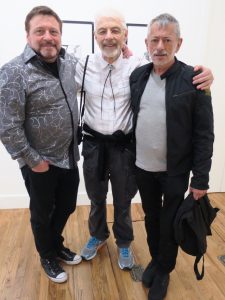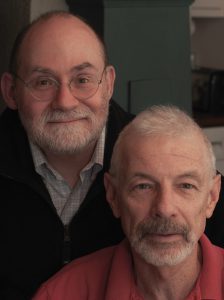Perry at 7-years-old with father Louis Brass and sister Nancy Belle Brass at the Battery, 1954, Charleston, SC. Perry shares, “My father was born in Charleston, and we went back there, before his tragic death from cancer in 1958, often.” Photo courtesy of Perry Brass.
Perry, circa 18 or 19-years-old, and his mother Helen Landy Brass in Savannah, GA. They’re in one of the famous downtown squares. Photo courtesy of Perry Brass.
Perry (on right) at 19-years-old with Dick Farnsworth (his first lover), 1967, Central Park, New York City, NY. Photo courtesy of Perry Brass.
Perry in the window of his walk-up apartment in Hell’s Kitchen, 1971, New York City, NY. Perry shares, “We published Come Out!, the Gay Liberation Front’s newspaper, from here.” Photo courtesy of Perry Brass.
Perry and sister Nancy Belle Brass at Riis Park, circa 1972. Photo courtesy of Perry Brass.
(L-R): Steven Grossman, Ronald Helman, Miles Brown, and Perry Brass, 1973, Central Park, New York City, NY. Perry shares: “This picture was taken at an anti-war demonstration in Central Park. On the far left is Steven Grossman, a singer-songwriter who became the first openly gay performer to be signed to a major record label, Decca Records.” Photo courtesy of Perry Brass.
Author photo featuring Perry Brass holding two tulips, 1993. Photo Credit: Anthony Colantonio. Photo courtesy of Perry Brass.
Author photo featuring Perry Brass in a bolo tie, 1995. Photo Credit: Anthony Colantonio. Photo courtesy of Perry Brass.
(L-R): Giles Denizot (singer), Mimi Sterne-Wold (producer), Lisa Gilbert (poet) and Perry Brass, circa early 2000s. Perry shares, “This was taken after Giles sang, “All the Way Through Evening”, my song cycle collaboration with the late Chris DeBlasio.” Photo courtesy of Perry Brass.
Perry with Don Bachardy, artist and partner of Christopher Isherwood, at Bachardy’s house, 2007, Santa Monica, CA. Photo courtesy of Perry Brass.
Perry and Kate Clinton during the filming of “Out in the City”, 2010, New York City, NY. Perry shares, ““Out in the City” was a promotional film to get LGBTQ tourists to come to NY. The film had extended interviews with me talking about the last 50 years of gay life in New York.” Photo courtesy of Perry Brass.
(L-R) Robert Woodworth, Perry Brass, and Seth Smith at the Rainbow Book Fair, 2011, New York City, NY. Photo courtesy of Perry Brass.
Perry and his wonderful friend Ricardo Limon at the Rainbow Book Fair, 2013, New York City, NY. Photo courtesy of Perry Brass.
(L-R): Perry Brass, Hugh Young (his husband), and Lee Ellis at the New York Bureau of Marriages for the Brass-Young wedding, June 2014. Perry shares, “Lee Ellis is my oldest friend from my growing up in Savannah, GA.” Photo courtesy of Perry Brass.
(L-R): Jerry Kajpust, Perry Brass, and Ricardo Limon at the Leslie-Lohman Museum of Gay and Lesbian Art, SoHo, New York City, NY. Photo courtesy of Perry Brass.
Perry (positioned lower) with his husband Hugh Young, 2016. Photo Credit: Steven Dansky. Photo courtesy of Perry Brass.
Perry Brass was born in 1947 in Savannah, Georgia. His family was part of a close-knit community of mostly Polish Jews. Perry’s relationship with his mother was troubled, but his father exhibited a deep acceptance for Perry—just as he was. When he took Perry hunting, the sound of gunfire literally made Perry throw up. But his father took him aside and said he would never take Perry hunting again. When Perry was 11, his father died, leaving his family bankrupt. Perry spiraled downward. At 15, he attempted suicide. He later wrote, “I did not have to ever go to anyone for validation, support, or even simple nourishment. I had no family basically to worry about. I could not be disowned because no one had ever sheltered me.”
At 18, Perry fled the South, moving first to San Francisco for a year, then ping-ponging across the country to New York City, where he threw himself with abandon into the city’s gay culture. He heard of the practice of gay men carrying “cop money” (around $40) to buy off police officers who preyed on their cruising zones. This infuriated Perry. In 1969, the police raided the Stonewall Inn in Greenwich Village, and the gloves finally came off. Perry was exultant. In the violent street protests, in the shattered glass covering the streets of Sheridan Square, Perry saw something powerful – an intangible force that, nearly a century earlier, Walt Whitman had called “adhesion.” Perry immediately joined the Gay Liberation Front, publishing the organization’s groundbreaking radical newspaper Come Out! from his Hell’s Kitchen apartment. Soon after, Perry and two friends founded the Gay Men’s Health Project Clinic to look out for the unique health needs of gay men. Organized and run by the men who used it, rather than doctors, the clinic still exists today as Callen-Lord Community Health Services, with an annual budget of more than $70 million.
But Perry’s true vocation was to become “a writer for the community.” His aim was “to bring the entire life cycle of gay men into focus.” He embarked on his quest in 1975. In 1990, he wrote a book of poetry combined with photographs of gay men. All the gay presses turned him down, so he decided to self-publish with the help of his partner Hugh. The book sold 3,000—an almost unheard-of number in the genre. Perry never looked back. Today, he has published a total of 16 books and been a finalist six times in three different categories (poetry; science fiction/fantasy; and spirituality/religion) for prestigious Lambda Literary awards. Perry’s work has been anthologized in countless anthologies as well as the Huffington Post, and he is a member of the PEN America Society.

